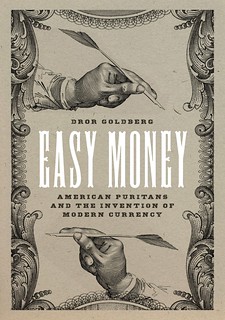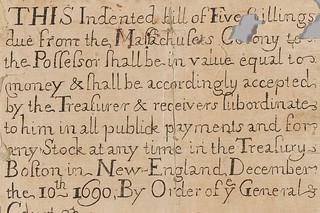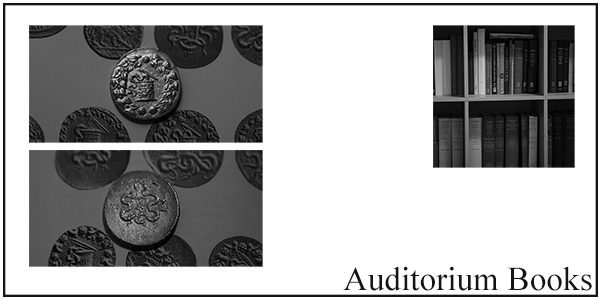
Last week we mentioned the new book by Dror Goldberg on the development of currency in the colony of Massachusetts. John Mellman passed along this review of the book in The Wall Street Journal. Thanks.
-Editor
 The year 1692 is infamous in Massachusetts history. It was then that, in Salem, hundreds of women—and men too—were accused of witchcraft, and 20 were tried and executed for an imaginary crime. In the same year, another momentous event took place in the colony, though it has nothing of the same notoriety: The Puritan leadership that had overseen the Salem Witch Trials—responding to some of the same social pressures that had fueled the witch craze—perfected a financial instrument that would prove to be the template for modern currency. In brief, they reimagined money primarily as legal tender for taxes, a conceptual revolution that makes the government's authority the only source of a currency's value. This is the basis of the monetary system that prevails throughout the world today under the reign of the Almighty Dollar.
The year 1692 is infamous in Massachusetts history. It was then that, in Salem, hundreds of women—and men too—were accused of witchcraft, and 20 were tried and executed for an imaginary crime. In the same year, another momentous event took place in the colony, though it has nothing of the same notoriety: The Puritan leadership that had overseen the Salem Witch Trials—responding to some of the same social pressures that had fueled the witch craze—perfected a financial instrument that would prove to be the template for modern currency. In brief, they reimagined money primarily as legal tender for taxes, a conceptual revolution that makes the government's authority the only source of a currency's value. This is the basis of the monetary system that prevails throughout the world today under the reign of the Almighty Dollar.
Dror Goldberg's Easy Money provides an engrossing narrative account of this lesser-known crucible. Although scholarship about the first American colonies could fill the Mayflower, Mr. Goldberg's chronicle is the first book-length attempt to explain why a defining concept in our global financial system emerged within a desperate theocracy on the fringes of the British Empire.
Unlike Virginia and other early colonies in the New World, Massachusetts was led not by aristocratic adventurers but by the upwardly mobile middle classes of English society. And, as Mr. Goldberg points out, the colony was founded at precisely the moment when England was beginning the leap from an agricultural to a capitalist economy. Devout religious motives led the Puritans to Massachusetts, but financial ingenuity allowed their pious enterprise to survive and thrive.
Lacking the institutional structures that reinforced social order in the Old World, Massachusetts's leaders relied on consensus and consent. Though the ministerial elite tolerated no dissent in its religious mission, on practical matters, such as raising revenue and spending it, the colonial government was the most democratically accountable in the world at the time. For good reason, Alexis de Tocqueville identified the colonial New England township as the seedbed of American democracy.
 Other governments had attempted to solve their fiscal problems by printing paper and trying to force everyone else to accept it as money, with disastrous consequences. Massachusetts was the first to give paper currency genuine value by requiring only that the government accept its notes as payment for taxes. Since the colonial government could force its citizens to pay taxes, its willingness to accept its own notes made everyone else willing to accept them, too. Two years later, after risk of a veto from the king had diminished, the colony expanded the legal-tender act to make its notes lawful payment for both taxes and debts. With that additional change, Massachusetts's notes became, Mr. Goldberg says,
Other governments had attempted to solve their fiscal problems by printing paper and trying to force everyone else to accept it as money, with disastrous consequences. Massachusetts was the first to give paper currency genuine value by requiring only that the government accept its notes as payment for taxes. Since the colonial government could force its citizens to pay taxes, its willingness to accept its own notes made everyone else willing to accept them, too. Two years later, after risk of a veto from the king had diminished, the colony expanded the legal-tender act to make its notes lawful payment for both taxes and debts. With that additional change, Massachusetts's notes became, Mr. Goldberg says, nearly identical to the currency of the early twenty-first century.
The power to print money is bewitching however, and led to later troubles.
See the related article elsewhere in this issue about bank failures in the U.S.
-Editor
The Puritans in 1692 were careful to print no more notes than were to be collected as taxes. This required a superb level of discipline, Mr. Goldberg writes, one that could be expected perhaps only of . . . Puritans. But even they were not immune to the intoxicating power of their invention. The liberating effects of the original legal-tender laws quickly gave way to the scourge of inflation. And the effects were not confined to the economy. Legislative meddling with the relationship between creditors and debtors, as James Madison later wrote, would strike at the foundation of a free society, destroying confidence between man and man.
... one lesson that comes across in Mr. Goldberg's estimable book would have struck the Puritans themselves. The figure the Puritans referred to as that old deluder, Satan has many ways of preying upon the minds of men. The modern word for credit comes from the Latin word credere, meaning to believe. Massachusetts showed how a government can create money out of its own credibility as a tax collector. But that same capacity allows governments to disguise—temporarily—the inescapable fact that they must ultimately collect in taxes the same amount they spend, creating a tempting delusion we moderns still cannot resist.
To read the complete article (subscription required), see:
‘Easy Money' Review: The Currency and the Commonwealth
(https://www.wsj.com/articles/easy-money-book-review-the-currency-and-the-commonwealth-87923f12)
To read the earlier E-Sylum article, see:
NEW BOOK: EASY MONEY
(https://www.coinbooks.org/v26/esylum_v26n13a03.html)
Wayne Homren, Editor
The Numismatic Bibliomania Society is a non-profit organization
promoting numismatic literature. See our web site at coinbooks.org.
To submit items for publication in The E-Sylum, write to the Editor
at this address: whomren@gmail.com
To subscribe go to: https://my.binhost.com/lists/listinfo/esylum
Copyright © 1998 - 2024 The Numismatic Bibliomania Society (NBS)
All Rights Reserved.
NBS Home Page
Contact the NBS webmaster
| 



